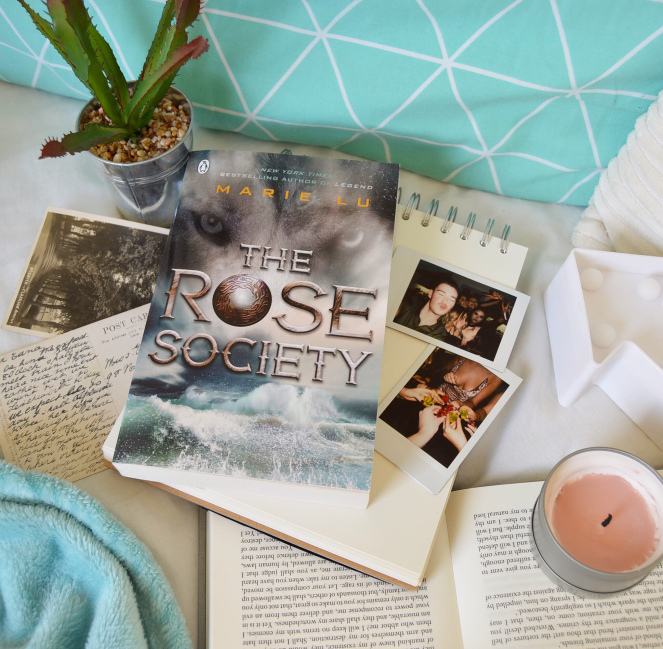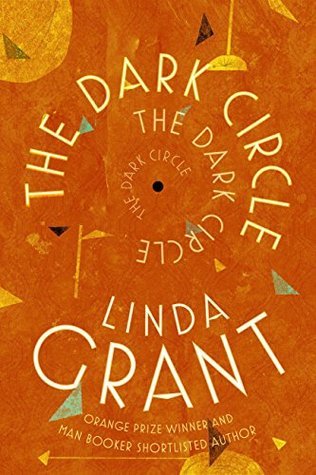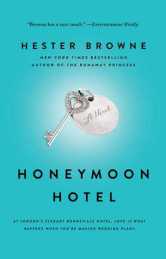PULSE
Japan, 2001
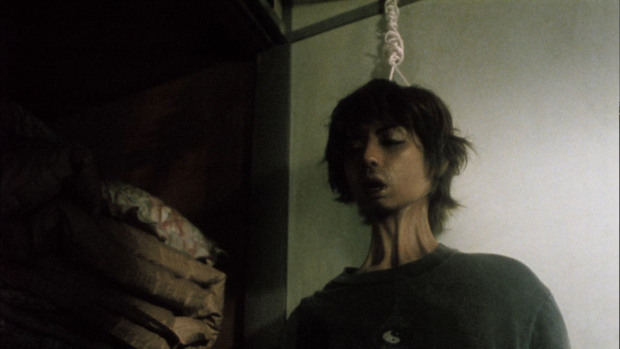
Before he worked in mainstream commercial cinema Japanese director Kiyoshi Kurosawa made thirteen movies that went direct to video. Six of those movies were part of a series called Suit Yourself Or Shoot Yourself. In Pulse one of the characters says, ‘The wish for freedom is the acceptance of loneliness.’ The philosophical stance of Kurosawa is not too difficult to discern. Most of us, of course, understand the price and mix and match, we try to both suit and shoot within a life. Kurosawa is no slouch himself. He mixes and matches in Pulse. As he claims in interviews, art and entertainment coexist in most Japanese movies including his own. Poetry and ideas, though, make demands of the narrative. In Pulse there are also two separate stories. The film has many qualities but coherent it is not. Kurosawa admitted he put in the film anything he could think of at that time. Some scenes feel as if they were written on the day of shooting.
The basic concept in the movie, though, is original and commendable. Ghosts break through the barrier that separates them from the living. Technology plays a part. The Internet helps the ghosts make contact. Websites ask users if they want to meet a ghost. Not all of this makes sense but we can accept the basic idea that there is a contagion that will invite death. People will become lonely ghosts, just like the ones that are already out there. The movie suggests that the Internet will narrow rather than expand our world. Much of what is around us will be ignored and not understood. It is happening but it happened before the Internet. Our lives feel important while we live them but most of us go to our graves with an inability to make sense of the world. Stephen Hawking does his best but few understood his book.
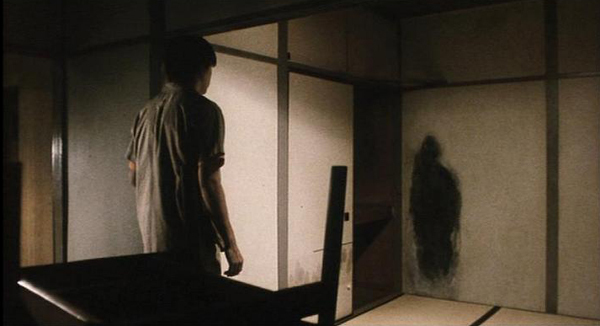
For the really curious Pulse is not much help. The ghosts in the film are far from consistent in how they behave and exist. The response from humans to the ghosts also varies. Some hang themselves, others brood for a long time and one survivor even keeps a ghost for a pal. What happens between the ghosts and the humans feels more to do with the requirements of the plot than the principles of an imagined world.
The trick for a viewer is to go with the flow. Pulse has ideas and some memorable scenes including a fine suicide that really looks like a woman throwing herself off the roof of a tall building. The ghosts are not always scary but as in the novels of M R James they exist and are visible. Because the movie is rooted in an enquiry into a phenomenon, the early scenes have the feel of the stories of M R James. In this instance, though, the investigator is a young student and not an ageing academic. Instead of there being a museum or abbey that contains the secret there is the Internet. This is M R James but with trainers. The movie also has atmosphere. It has low lighting and is shot in a brown filter that gives a rewarding but dystopian view of Tokyo that prepares us for the apocalypse when it arrives. The concrete environment is oppressive and remote. The soundtrack is also unnerving and interesting although the wailing soprano will not be to the taste of everyone.

The opening scene of the film takes place in an indoor market garden. Surrounded by greenery the characters share tasks and interact with each other. We are watching humans being sociable creatures and they are, well, human. Home consists of a small apartment wired up to technological equipment that offers diversions. It exists in a concrete wasteland. The humans that need to rest before the next day are anonymous and reduced. Despite the vague philosophy occasionally uttered the men and women say little in Pulse. They haunt a world they no longer understand or command. The economics student Ryosoke has two relationships with women in the film but little is communicated between him and the women he meets. The attraction consists of two people not doing much more than liking the look of one another. The final relationship, which exists between a human survivor and a ghost that either sleeps or melts into a wall, can be regarded as either romantic or cynical. If there is commitment to a deceased lover, romance in Pulse amounts to nothing but a desire to avoid loneliness. The ghosts with their warnings of immortality and loneliness confirm what the cynics and pessimists have claimed. Romantic relationships offer nothing more than short-term escapism.
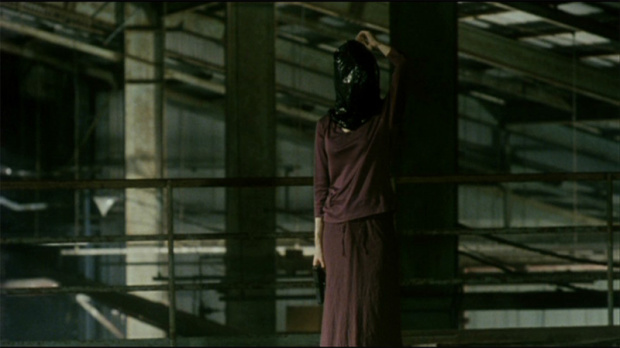
Those thoughts alone make Pulse interesting but the film is also compelling because it blurs the distinction between ghosts and humans, the dead and the alive. The ghosts are aliens from another place and thanks to technology and its ability to create epidemics they have invaded the world of the not yet dead. The lonely ghosts encourage the humans to commit suicide. The more ghosts the merrier, and at the end of Pulse there are more than a few. The ghosts appear to believe that together with humans they can find something other than the loneliness that defines us all. I have to admit that I was a little confused at times. Phrases like ‘make them immortal by trapping them in loneliness’ did not help. That sounded awfully like a chicken and egg argument. Nevertheless the movie is good at making us uneasy about modern life and the contract it offers to human beings.

In the 1986 classic novel by Richard Ford, The Sportswriter, the author makes a clear distinction between living and existence. The former requires a commitment to and from other people. Mere existence is solitary and restless. Living, to be alive, has consequence and progress, and that is rooted in a commitment to other people and a concern for the lives they lead. Existence settles for the off the shelf comforts of the modern world – TV, sport, the vicarious pleasures of the Internet, liquid and other stimulants, casual sex and the rest. Faced with the options and diversions provided in this century it is not just the timid that settle for existence.
Not all writers are sympathetic to the notion that the solitary life is nothing more than existence. Many are content for their lives and their identities to be determined by what they read and write. Although filmmakers need to cooperate with others for their work they talk in the same way about films. Artists need the freedom that their work gives them, and if the price is loneliness, so be it. But Richard Ford and Kiyoshi Kurosawa are clear. Living and life require other people and something other than ghosts and the Internet. Settle for them and you confuse the distinction between mortality and immortality. All that is left is endless time that is either wasted when we are alive or endured after we die. At the beginning and the end of Pulse the remaining survivors are on a boat that is heading towards South America. The intention is to find other people who will enable them to live their lives. They are not looking for a socket to plug in the computer. The sky above the boat is grey and threatening but the heroes have made progress since the moment Ryosoke logged on to the Internet for the first time. As it happens, the discovery of the Internet by Ryosoke is a fine scene and captures well that initial mix of trepidation, excitement and anticipation. For nostalgia value alone Pulse is worth a look.
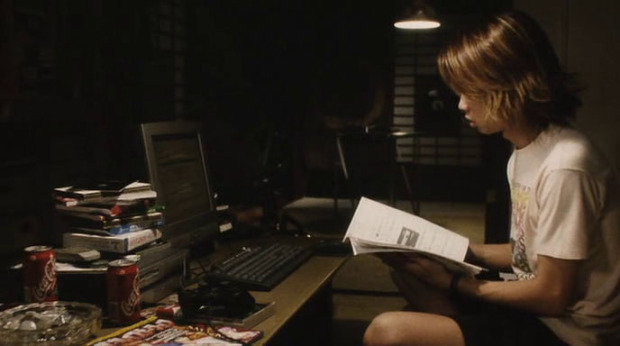
Assuming that there will be no apocalypse and there are no ghosts queuing up inside Google, we have to assume that the Internet is bound to persist. Opinion about whether it is harmful or not to the human race is divided. Internet Addiction Disorder is now a recognised complaint. The legion of obese males who stay attached to their terminals may or may not be a myth. There have, though, been some serious incidents where people have forgotten they had to feed themselves because they were caught up in conversations, games and so on. The Internet can disrupt lives. Those concerned about the Internet argue that it will affect how our brain cells operate, damage long-term memory and reduce the attention span. Brain patterns change when people use the Internet. Sustained use may or may not have harmful affects but whatever happens it will change what we carry between our shoulders. Privacy has also become confused. On the Internet people are less inhibited but also have an altered view of what constitutes the privacy of another person. Research has estimated that Internet readers struggle to maintain attention beyond 593 words. This figure has no regard to the instant clicks. It is a mode average. The average Internet user reads 593 words when he is interested in a topic. And because the Internet carries so much information there is much that will be ignored. 593 words tops? I had better finish here.
Howard Jackson has had six books published by Red Rattle Books including novels, short stories and Horror Pickers, a collection of film criticism. If you are interested in original horror and crime fiction and want information about the books of Howard Jackson and the other great titles at Red Rattle Books, click here.
Advertisements Rate this:Share this:
